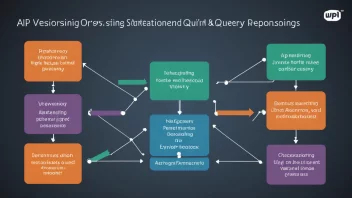The advent of artificial intelligence (AI) has significantly transformed software development, raising important ethical considerations that developers must navigate. In this article, we will compare two prominent ethical frameworks—utilitarianism and deontological ethics—highlighting their pros, cons, and differences in the context of AI and software development. By examining how each framework influences decision-making, we aim to provide a clearer understanding of their applications in the ethical landscape of AI.
Understanding the Ethical Frameworks
Before diving into the comparison, it is essential to understand the foundations of each ethical framework.
Utilitarianism
Utilitarianism is a consequentialist ethical theory that posits that the best action is the one that maximizes overall happiness or utility. In the context of AI, utilitarianism focuses on the outcomes of software applications, assessing their impact on society as a whole.
Key Features of Utilitarianism
- Focus on Consequences: The morality of an action is determined by its outcomes.
- Maximization of Happiness: The goal is to achieve the greatest good for the greatest number.
- Quantitative Approach: Utilitarianism often relies on calculations to assess the benefits and harms of a decision.
Deontological Ethics
Deontological ethics, on the other hand, is non-consequentialist, emphasizing the intrinsic morality of actions themselves rather than their outcomes. This framework asserts that certain actions are morally obligatory, regardless of the consequences they produce.
Key Features of Deontological Ethics
- Focus on Duties and Rights: Actions are evaluated based on adherence to moral rules and duties.
- Emphasis on Intention: The intention behind an action is crucial to its moral evaluation.
- Universalizability: Moral principles should be applicable universally, regardless of context.
Comparative Analysis
Practical Applications in Software Development
Both frameworks offer valuable insights into AI ethics, but they apply differently in software development.
Utilitarianism in Software Development
Utilitarianism encourages developers to consider the broader impact of their software. For example, when creating an AI-driven healthcare application, a utilitarian approach would involve assessing how the application improves health outcomes for the population, potentially allowing for trade-offs in individual privacy for collective benefits.
Deontological Ethics in Software Development
In contrast, a deontological perspective would argue that developers must respect user privacy and informed consent as moral imperatives, regardless of the potential benefits of data usage. This framework would advocate for strict adherence to ethical guidelines that protect individual rights, even if it means limiting the software's effectiveness.
Pros and Cons
Utilitarianism
Pros:
- Encourages innovation and progress by focusing on beneficial outcomes.
- Allows for flexibility in decision-making, adapting to varying contexts.
- Facilitates a quantitative analysis of ethical dilemmas.
Cons:
- Can justify unethical actions if they produce a net positive outcome.
- May overlook individual rights and dignity in favor of the majority.
- Risk of quantifying intangible values, like emotional well-being.
Deontological Ethics
Pros:
- Prioritizes individual rights and moral duties, promoting justice.
- Provides clear guidelines for ethical behavior, reducing ambiguity.
- Encourages accountability for actions regardless of outcomes.
Cons:
- Can be rigid and inflexible in complex situations.
- May lead to suboptimal outcomes if moral rules conflict with practical needs.
- Can stifle innovation by imposing strict ethical constraints.
Case Studies
Case Study: AI in Autonomous Vehicles
In the development of autonomous vehicles, utilitarianism may support the programming of algorithms that prioritize the greater good in scenarios of potential accidents. For instance, an autonomous vehicle might be programmed to swerve to avoid a larger group of pedestrians, even at the risk of harming a single individual.
Conversely, deontological ethics would challenge this approach, advocating for the protection of all lives equally and insisting that the vehicle should not be programmed to actively choose to harm any individual, regardless of the situation. This clash illustrates the tension between maximizing overall safety and adhering to absolute moral principles.
Case Study: AI Surveillance Systems
In implementing AI surveillance systems, a utilitarian approach might justify widespread monitoring for the sake of enhancing public safety and reducing crime rates. Proponents argue that the benefits to society outweigh the privacy concerns.
On the other hand, a deontological perspective would argue against such surveillance, emphasizing the inherent right to privacy and the moral obligation to obtain consent from individuals being monitored. This highlights the ethical dilemmas faced when balancing collective security with individual freedoms.
Conclusion
In conclusion, both utilitarianism and deontological ethics offer valuable frameworks for navigating the complexities of AI in software development. While utilitarianism emphasizes the outcomes and potential benefits for society, deontological ethics focuses on protecting individual rights and moral duties. Developers must consider the implications of each framework and strive for a balanced approach that respects ethical principles while also fostering innovation. Ultimately, the choice between these frameworks may depend on the specific context and values of the stakeholders involved in the development process.






